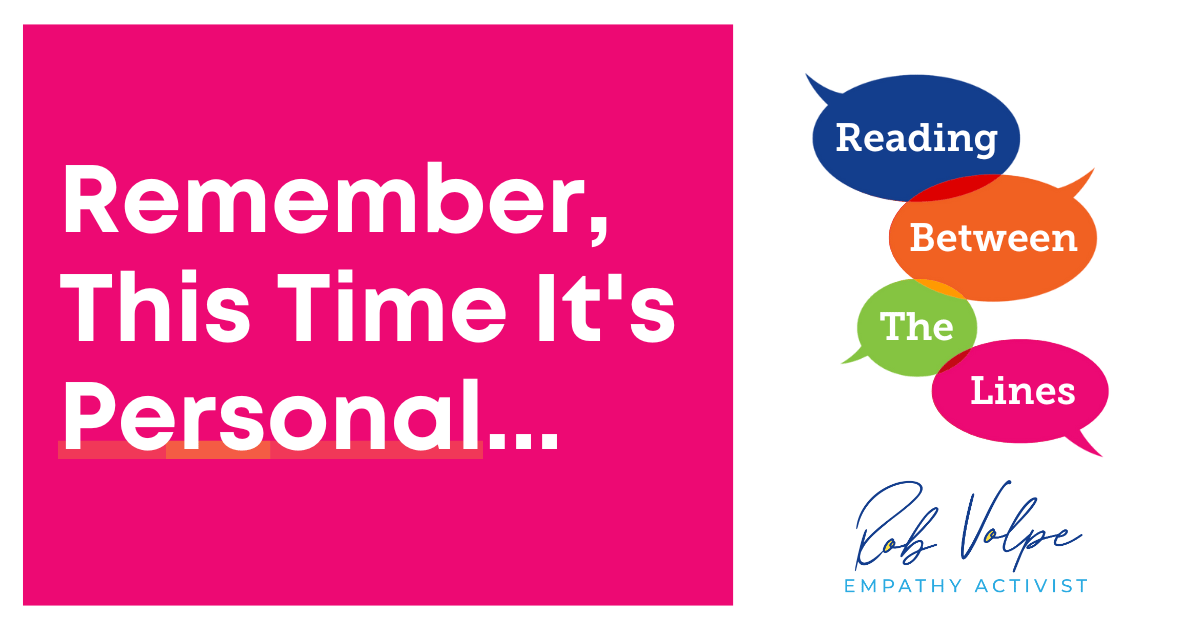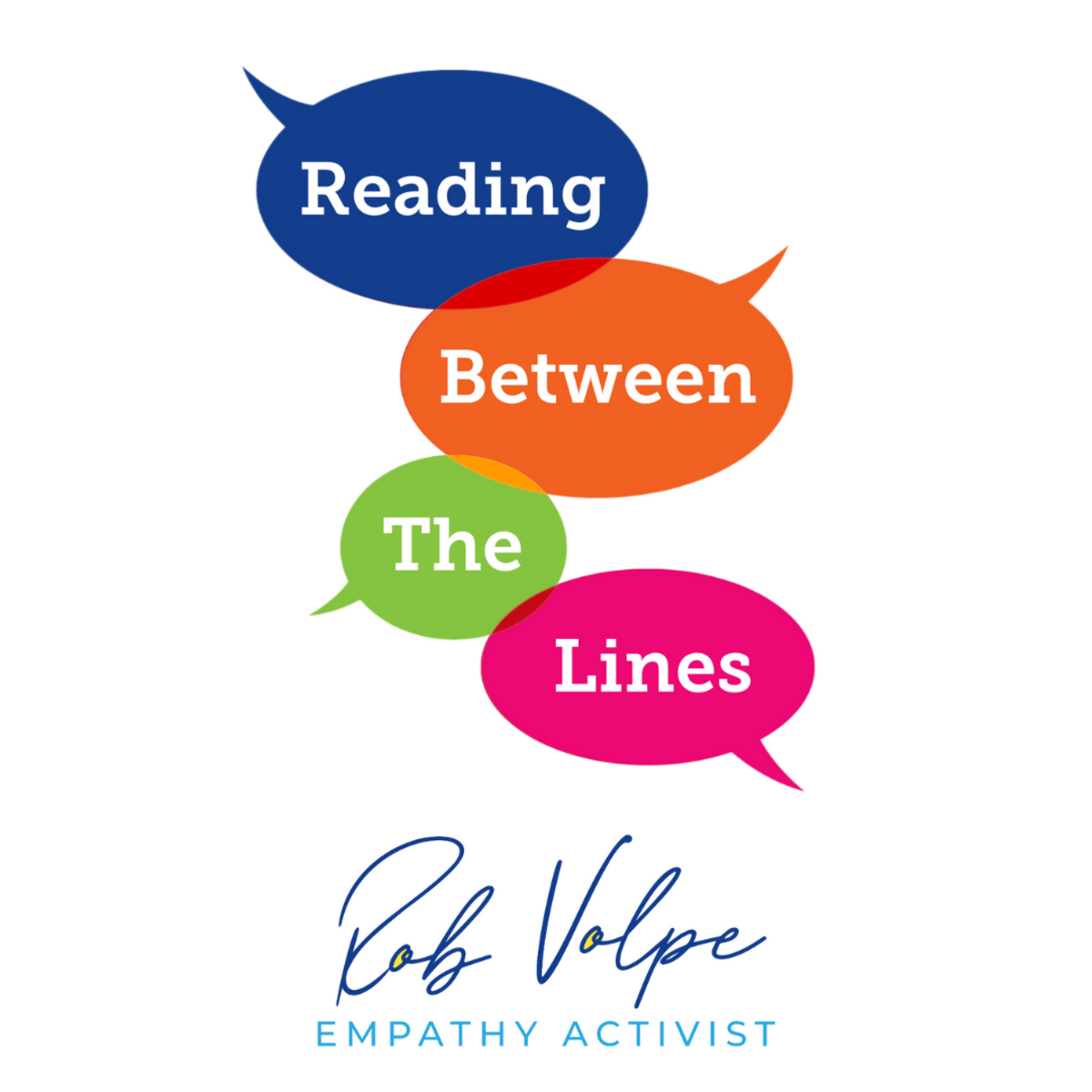Table of Contents
→ The ROI on Using Empathy at Work
→ Q&A: This Emotionally Draining Election
→ Can AI Write Better Than a Bestselling Author?
→ Empathy: As Seen In Real Life
Hi! Hope you are having a great day!
Welcome to all the new members of the community - thank you for subscribing! I’m grateful for your interest.
The content of this newsletter is shaped partly by what you respond to so please let me know your thoughts, questions and topics you’d like to explore with me.
As always, a quick reminder of what you can expect in each edition of Reading Between the Lines…
My thinking is here in the newsletter. Links are for diving deeper.
I strive to deliver ‘news you can use’.
I also share insights into human behavior and topics I’m thinking about.
I include amusing or interesting “slice of life” moments.
The Q&A feature is based on questions that come up in conversation - please send me your questions!
I’d like to hear your thoughts- ‘reply’ to this email or reach out directly to: [email protected]
What is the ROI on Being Empathetic?
“Why should we do this? What’s the ROI?” is something I frequently get asked when pitching empathy training and presentations to different organizations, as though empathy were a new contact database software that will improve efficiency by 37%, thereby covering the cost of the training in 3 months.
Similarly, individuals ask the question about can they gain by being more empathetic.
I understand that new behavior must be justified by some financial or other advantageous return in order for it to be adopted. The challenge with measuring the results of empathy, which I’ve shared in the past, is that it’s useful in everything we do to be successful. Empathy is a way of being.
A salesperson may or may not immediately see a change in results by using empathy in a negotiation. What they will experience is a strengthening of relationships that over time will yield stronger results. Empathy is like that rising tide lifting all boats. The lack of empathy is like the water pulling away as the tide empties.
The good news is that we have more data to help back up the ROI on being empathetic in the workplace. The 2nd part of the State of Workplace Empathy report is now available and it dives into helping organizations think about the game plan to enhance empathy in their organization.
Why is that important? you might ask. What is the ROI? The study indicates that 70% of employees recognize that the company’s financial performance is tied to having an empathetic organization. That’s a lot of people.
Among CEOs, 82% believe empathy is tied to financial performance. Yet there is a paradox because 63% of CEOs feel it’s hard to consistently demonstrate empathy in their day to day life and 72% are concerned they will have their business decisions challenged if they display empathy. That’s an argument for some CEO empathy training to dispel some of the myths around this superpower.
Not only are employees believing empathy is linked to company performance, when asked the benefits of an empathetic organization, half of all employees said the following are the top benefits:
improved job satisfaction
increased motivation
more productive
better company culture
lower turnover
And 2/3 of employees said they’d be willing to work longer hours while half said they’d work for less money if the organization was empathetic.
So when someone asks you the ROI on empathy - in the workplace it’s a more motivated, productive, satisfied workforce that’s willing to stick around, work longer hours and maybe even take lower pay.
Who wouldn’t want that for their organization?
I recently spoke on the topic during an appearance on Good Things Utah.
For more, including the subtleties on building an empathetic organization, please check out the report and/or send me an email: [email protected] and let’s talk about how this can apply in your organization.
Q&A: Do you have any tips for someone feeling emotionally drained by this election cycle?
It has been dizzying. I know for myself I’ve been on edge since Biden stepped out of the race in late July. I’m just waiting for something else calamitous to happen to either political party. While it has been remarkably calm, I don’t trust it. This has me looking at the news headlines constantly in a search for the latest events that will potentially alter the course of the election once again.
If you are finding yourself on edge, having a little self-empathy to understand what it is that has you feeling drained will help you recharge. I believe it’s important to stay informed however I also recognize there’s only so much a person can take before feeling overwhelmed.
Identify where the drain is coming from - challenge yourself to cut back the number of times you look at the headlines each day; find ways to nurture a sense of calm; do things that bring you joy; share your concerns with a trusted friend so you don’t feel so isolated; and if it’s conversation with people with different viewpoints, check out these earlier issues of the newsletter and listen to this Live Happy Now episode where Paula Felps and I dive into real life scenarios and how to handle them.
And regardless of where your political leanings may fall, I deeply believe in Michelle Obama’s encouragement to “do something” instead of get swept up in the emotion. Channel that energy into action. The side of the aisle that you affiliate with could use your help.
Additional issues to check out…
Can AI Write Better Than a Bestselling Author?
Earlier this year I experienced cognitive dissonance when someone submitted a paragraph written in the style of author Rob Volpe. I shared the results and my reaction in this newsletter.
This summer, bestselling author Curtis Sittenfeld took on an assignment to write a 1,000 word short story utilizing themes, objects and events suggested by The New York Times readers. The twist is that the assignment was also going to be given to AI (I believe ChatGPT) to also write a similar length short story. Both are published in this NYT piece and the reader is asked to guess which is written by whom/what.
I invite you to check it out and consider how you are engaging with the story while you ponder which is human and which is AI. And then check out the comments section to this piece - really fascinating!
Finally - let us know if you were able to identify the story written by Curtis Sittenfeld by answering the single-question poll below.
Empathy: As Seen In Real Life
I love when people send me examples of empathetic and unempathetic behavior that they come across on social media and in the news. Email or DM it to me and I’ll share.
I was struck by how many times empathy was mentioned and by so many different speakers at the Democratic National Convention last week. It was like the word was liberated. And it wasn’t just the word ‘empathy’ was used, it was also how men displayed empathy when talking about issues that are important to women. This piece from The 19th showcases examples of that, particularly around women’s reproductive health. (Thanks to Mallory W. for sending this to me)
There’s good news on the state of our empathy skills according to this article from CNN. Social psychologist Sara Konrath, the lead researcher on the foundational study I often cite showing the 40% decline in empathy among college students between 1979 and 2001 - has found in an update to that study that college students are beginning to return to more perspective taking with their peers. Empathy is desired by many but our cynicism can get in the way, according to Stanford’s Jamil Zaki. This affirms data Ignite 360 uncovered in 2022 that 62% of US adults were concerned about our inability to overcome differences of opinion. We go into a cynical place and that leads to judgment, which has to then be dismantled as the first step in The 5 Steps to Empathy™. (Thanks to Sherri T for this submission).
I hope you liked this edition.
Please help spread the word - pass this newsletter along to someone you know that might also enjoy it. Either forward this email or invite them to subscribe at the click of the button below.
Reading Between the Lines delivers of-the-moment insights into empathy and human behavior; expect practical tips on using the skill of empathy in everyday life and exclusive updates to keep my community close. All on a biweekly basis.








